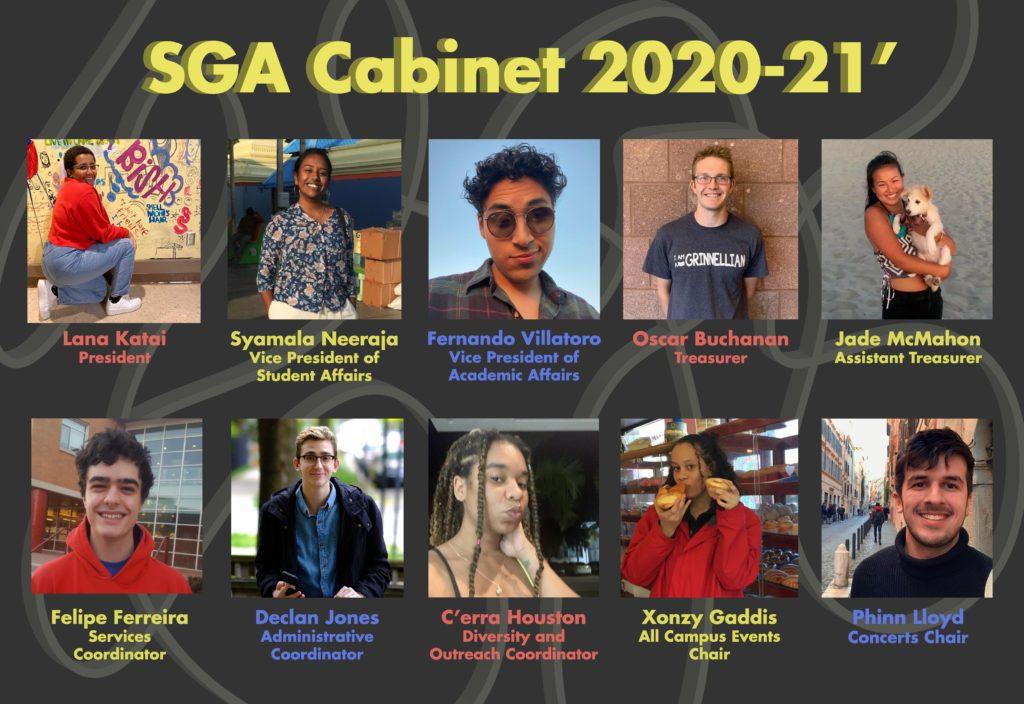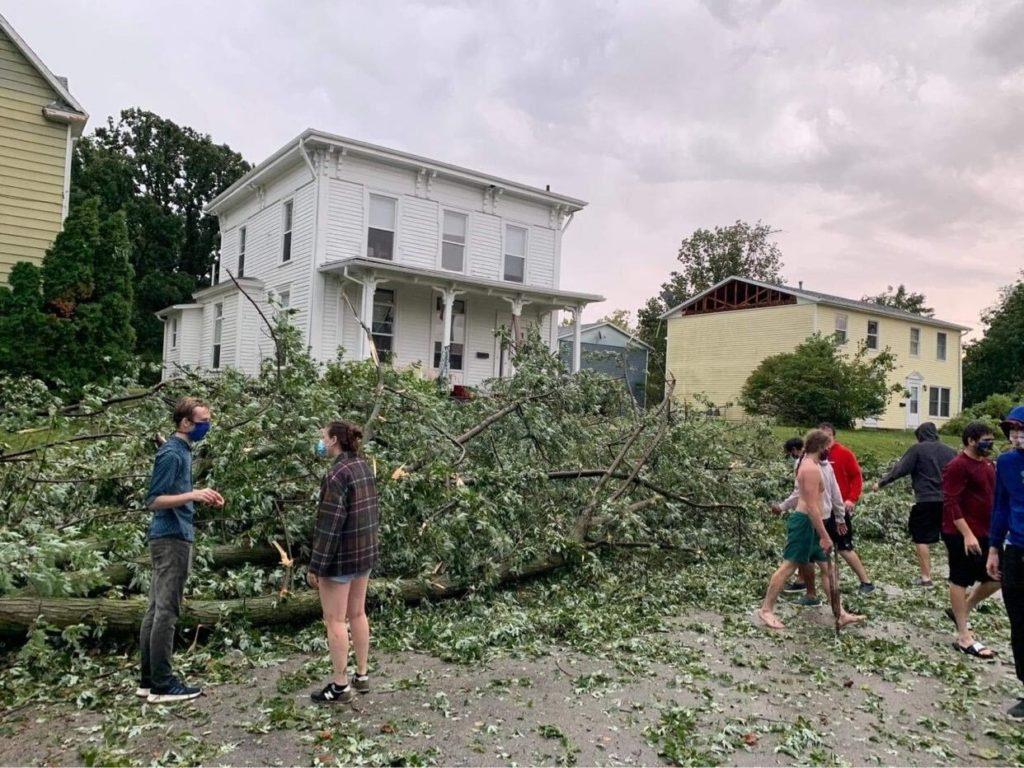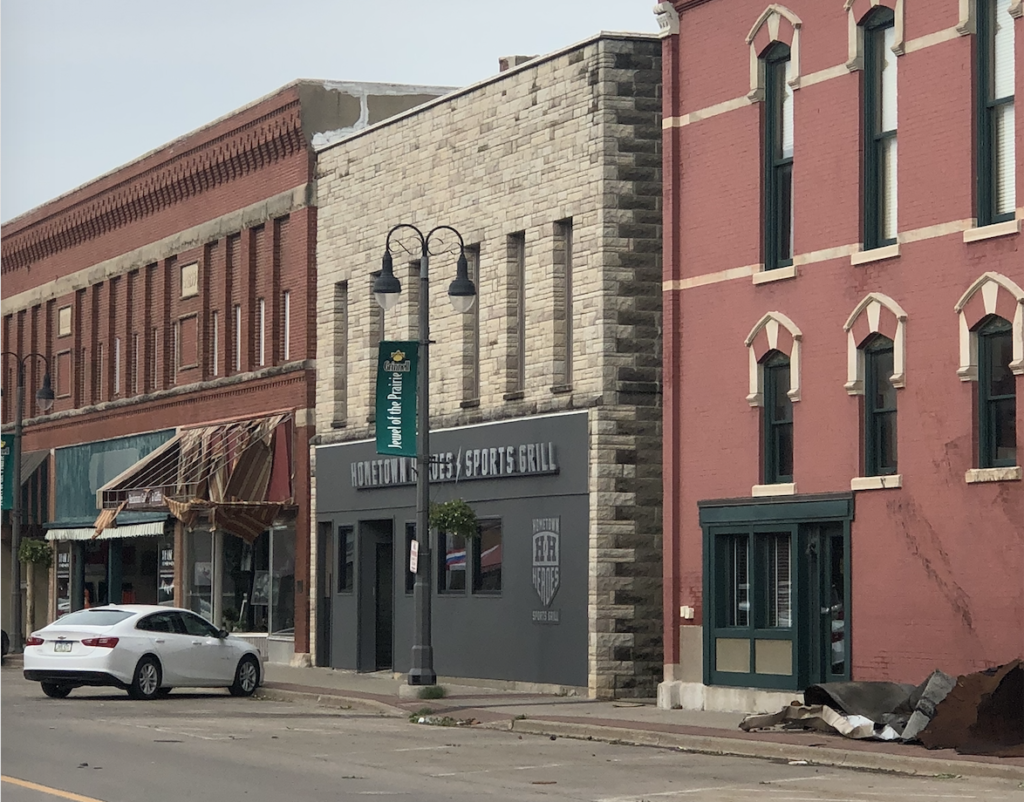On the week of Aug. 3, the Union of Grinnell Student Dining Workers (UGSDW) held a Week of Action to protest student employment cuts made by the administration due to coronavirus-induced remote classes. The S&B’s editors-in-chief Zoe Fruchter and Seth Taylor, both ’21, spoke with UGSDW president Jacob Schenyer ’21 and member-at-large Zoe Mahler ’20 about labor rights in a pandemic and the Union’s plans for the upcoming year. The conversation below has been edited for length and clarity.
Tell us about the inception of this week of action, and what your experience has been organizing remotely.
Jacob Schneyer: Shortly after they [the College administration] started announcing plans for the fall, we had a couple of public meetings to bring together people who had lost their jobs. We were concerned because we had heard from multiple people that jobs were just being completely cut – like SHAW drivers and CAs – so we wanted to give those workers a place to discuss what was going on and to discuss how they wanted to move forward, with the Union being able to provide resources and some structure. Those discussions led to the Week of Action.
The idea came from the fact that we were talking about how many different groups were affected by this job loss. It may seem to be just the people whose jobs were at stake, but it’s really a whole community issue. For example, with CA’s, it’s an issue for anyone who’s going to be on-campus, and particularly first years, to not have those positions. We had a lot of posts from alumni saying that student employment is part of what it means to go to Grinnell and if you provide opportunities for that you are changing the Grinnell experience.
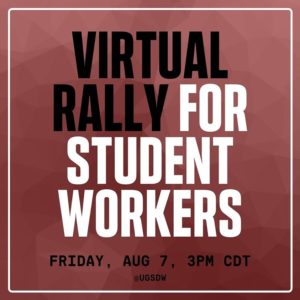
Zoe Mahler : We also talk a lot about how providing remote jobs in positions such as Writing Lab or research assistants is really important to a lot of people in completing their work. Grinnell works in terms of leaders supporting leaders and that’s still very important. So that’s another way the action ties into the whole community, not just student workers.
One of the things that we really liked about the virtual action is that we can still get a lot of engagement, and a lot of engagement that puts on the record to the College and is viewed by other students or incoming students. So, while a lot of stuff is being done online and a lot of people are on social media, there’s a lot of focus on action and representation and standing up for people who need it. I think that that’s one of the things that made us excited to do this. We thought it was the right time and the right opportunity to reengage with the student body.
Now that you’ve gone through the Week of Action, what has been the overall reaction to your campaign from students, alumni, administration and others in the Grinnell College community?
ZM: I think majority of our engagement has been from students. What’s been encouraging is that we’ve seen increasing engagement from our previous actions and more engagement from alumni and more engagement in terms of social media. Right now, our intention is to get students involved and invested in this and make sure they know that we are here to do what we can and to fight for them. One of the next steps we’ve been talking about is engaging with faculty members and gauging the response from the administration. But overall, I’d say this week has been really successful. We just ended our Zoom digital rally with 28 people and I think it’s one of the best turnouts we’ve had in terms of the digital actions, which is heartening because it says that people are concerned and it’s really important to them that we step up and take action.
This is a pretty expansive campaign both in terms of your actions and in terms of your demands, combining student worker testimonials, contractual negotiation points and more. Why go so big? Especially in this time, where the College is operating at an all-hands-on-deck level and when people in general are just doing all they can?
JS: In terms of why we’re going so big with the demands, it’s because we had those conversations with student workers and we asked them, ‘What do you need right now and what does the College need to provide for you?’ And as far as that, I think it’s not too drastic. As we’ve said, there are lots of opportunities for previously existing jobs to be turned virtual and new ways for students to be supported virtually. And the work-study grant part of it is just simply what the College’s policy was spring semester to compensate lost work study. There’s no obvious reason to me why that should change, especially in such a difficult economic time.
A part of our hope is that the College will recognize, as you said, that it’s a really difficult time for the administration and there’s a lot of stuff that they have to worry about. We’re hoping that they’ll recognize that student workers actually have a lot of ideas and opinions about how this should work, and by including their voices in the decision-making process and listening to what we have to say, that could save them a lot of work. At this time when they’re so stressed, we can step up and provide a clear vision of what we need.
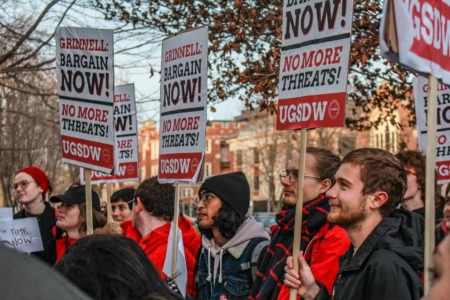
A lot of these demands seem to be on behalf of all student workers, whom UGSDW is not authorized to bargain on behalf of. Is this part of another bid for expansion or a social justice action for workers in general?
JS: It’s a bit complicated. We’re still committed to the fight for expansion. We still believe that that is what a super-majority of Grinnell student workers have voted for and that it’s our right to expand. We don’t believe that this particular campaign will result in that win. So, we are looking for other solutions and other ways for student-worker voices to be heard other than the formal bargaining process. That being said, we don’t want to seem like we’re replacing our bid for expansion because any steps that we are able to take in terms of student worker voices being heard helps in the general fight for expansion.
ZM: The point of fighting for expansion is so that things like this won’t happen, so that the Union will be able to represent all student workers and be able to sit at the table and bargain about things like whether or not students get to keep their jobs.
JS: Recently, I’ve been talking to the only other undergraduate student union in the country at UMass Amherst, and they represent RAs and they had gone through exactly that process with their college’s reopening plan, denying a lot of safety provisions for students living on campus and they were able to get a lot of changes passed on that through the normal bargaining process.
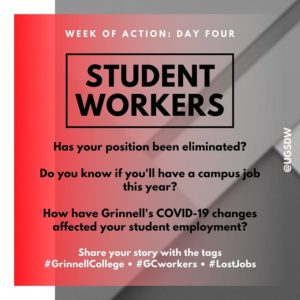
One of your demands is that the College create remote jobs for those students who lost their College jobs due to the pandemic. Who will do that work of creating and supervising these new positions?
JS: It could be through SGA, it could be through Human Resources, it could be through Student Affairs. But again, I don’t really know how the administration works so I can’t super accurately comment on who would be doing that work.
Is it fair for faculty and staff to take on that work when they are also developing a new framework for their own now-remote positions and juggling the challenges that COVID-19 has brought to all our lives?
ZM: I think that’s a fair question, but at the same time what we’ve been hearing from students is that it’s not fair to expect them to pay the same amount for online classes. And so what we’re saying is that it’s also not fair to expect students to have more loans, to replace our work study even when we’re not on campus, to expect us to use campus jobs to pay for living expenses, to pay for their food, to pay for their rent.
I think the main thing that we’re getting at is that we want to have our voices involved in this process and we want to be able give them clear demands and clear structure. We want them to understand that we’re not just making noise to make noise, that this really has put students in a really difficult position of deciding between continuing their enrollment or surviving.
JS: We do have empathy for administrators who are put in these difficult positions, and I don’t think our petition or our campaign should be taken as a call-out of any particular administrators. But the fact is we have a system at this institution where some people are in charge more than others and then it becomes those people’s responsibility to make things happen. And as we discussed there are lots of ways for student voices to be involved, and I can go to a pretty far extent as far as doing this work for creating some possible positions and figuring out how to do that.
We want them to understand that we’re not just making noise to make noise. – UGSDW Member at Large Zoe Mahler ’20
I’m sure as well if we were to hear something from College administrators saying, ‘We hear your demands. We hear what you need and we understand that. However, because of our lack of administrative capacity we can’t do that. But we can do this other idea that would also help those same things,’ I think a lot of people would be really happy about that. What we’re seeing now is pretty much no acknowledgement that having jobs on campus is really essential to students and really not a lot of transparency.
I’ve also heard that, for supervisors, so we’re talking about lower-level staff or faculty who supervise students, it’s been kind of like an opt-in process to create a rationale and explain why they need to continue to have student workers. That obviously creates a lot of work, because someone has to create those rationales and someone else has to decide if they’re good. I can imagine kind of a reverse situation where they say, ‘We expect you to all employ your students and have them do something useful. If you don’t think you can do that then give a rationale for why not.’ Maybe that doesn’t exactly fit our demands, but that addresses some of those things that Zoe was talking about, that students are really concerned about, that may be a little easier for administrators.
You’re asking for new remote jobs to be created, but you’re also asking for all work-study to be covered by new grants. Do you expect students who are working in remote positions to still receive those grants, or do you expect only those students who do not have remote jobs to receive those grants?
JS: The reason why we included both of those instead of just jobs and just grants is that they really can’t cover all issues. So international students living outside the country can’t work on campus, so it’s not really fair to them if we were just to say okay, ‘Don’t worry about the grants, just provide us jobs.’ Similarly, even during normal times, many students work above and beyond their work-study award to pay for living expenses. That’s something that Grinnell doesn’t really believe, because their position is that they meet 100% of need, but it is true according to our members. And so, if we just got full grants for work study there would still be financial need. Of course, there’s also the issue of providing useful services for the Grinnell community in this time. So that’s why we included both.
As far as having grants, last spring, the grants were given to basically fulfill the amount of money that students hadn’t earned. I can imagine a similar system now where if you have work that’s fine versus, if you can’t get a job you can apply for a grant. Those are details that we would certainly be interested in discussing or creating a plan for.
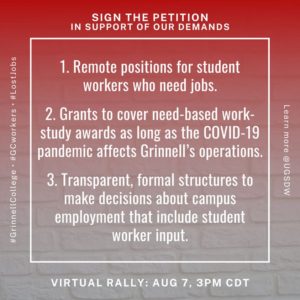
What is your ideal format for including student voices?
JS: I think that the most important thing is a place for transparency. Students workers are sharing their voices. One partial model might be the listening session we had last fall with the Trustees. That was a chance for workers to kind of just say what they had to say, and, because of some weird legal stuff, the trustees could not respond. Some CAs recently were organizing on their own with some help from the Union, had a meeting with Residence Life staff and admin. That was in a similar vein. They were able to share their concerns and ask questions directly to administrators. I think something like that would be really great.
As representatives of student dining services workers, can you speak to how Dining is going to look in this upcoming year and what those negotiations have looked like for that new contract?
JS: Unfortunately, I don’t have a lot to share yet because our bargaining has not yet started. I can tell you that I have been given an explanation of the safety procedures they’ll be using and that they have been using this whole time, and they’re very thorough. Our members feel protected.
There are some really big issues that we just have no information on right now. For example, sick leave and absence policy. We know certainly that anyone who tests positive or shows symptoms for the virus will be quarantined, as is the general plans for people who will be on campus. But currently in our contract there are consequences for every time you miss a shift, you get a point. And if you get five points you get fired. We don’t have a section for coronavirus, so if you were to be quarantined and you were to miss five shifts during that you’d just get fired. We don’t think the plan is to fire everyone who shows symptoms, but the administration can’t just decide that kind of thing on their own, they have to bargain with us.
What we’re seeing now is pretty much no acknowledgement that having jobs on campus is really essential to students and really not a lot of transparency. – UGSDW President Jacob Schneyer ’21
Our contract is currently expired which means that if they want to make any specific changes to basically anything, they will have to bargain with us. Obviously pay is also a big issue because there is increased risk involved in working in Dining. We hope that they are getting ready to seriously bargain with us soon.
In recent months we’ve been speaking nationally about how, while there have obviously been huge changes due to the pandemic, in some ways COVID-19 has just revealed systemic issues that were already there. Would you say that your new demands are things that you’d like to see happen anyway, or is this more of a concerted and specific response to the pandemic?
JS: I would say as far as our specific demands. they are pretty pandemic-specific, just because having jobs available is not generally an issue for student workers at Grinnell. And then the grant piece, again not generally an issue. The communication and transparency piece, however, I think is very central to that question, as it is in most civic issues. I think the question of students having a voice and being able to advocate for themselves in these types of socioeconomic situations is exactly the reason we’ve been fighting for expansion for all these years. And similarly to what we were just talking about with the lack of a cohesive plan from admin, that is something that we’ve been having trouble with for years.
What’s next? What steps are you going to be taking after this week of action to continue advocating for these demands?
JS: So, I think as far as this campaign I don’t think we have any set plans for upcoming things we can talk about right now. But there very likely will be and what we’re doing right now is getting more people involved to help out for organizing. As far as this fall, we’ll be working on obviously this contract and then a huge priority for us is to figure out how we can bring in first years who we will never see personally. And that’s always a huge part of our membership. So that’s a big question for us right now.
ZM: I think that our response really going forward, especially with this campaign, really depends on the admin’s response and what we hear from them in terms of what they’re willing to do or what their initial reaction is. There are multiple ways we could go, depending on how willing they are to work with us on this.




















































